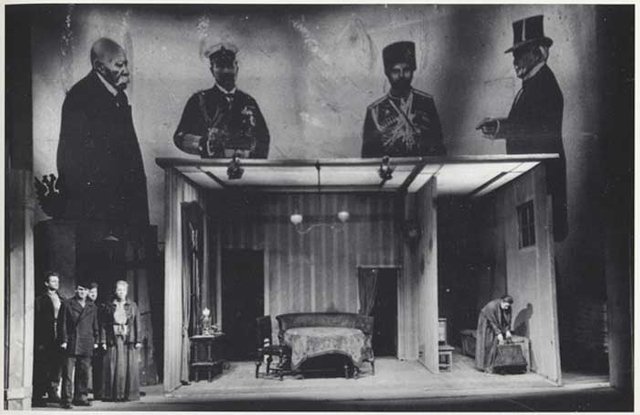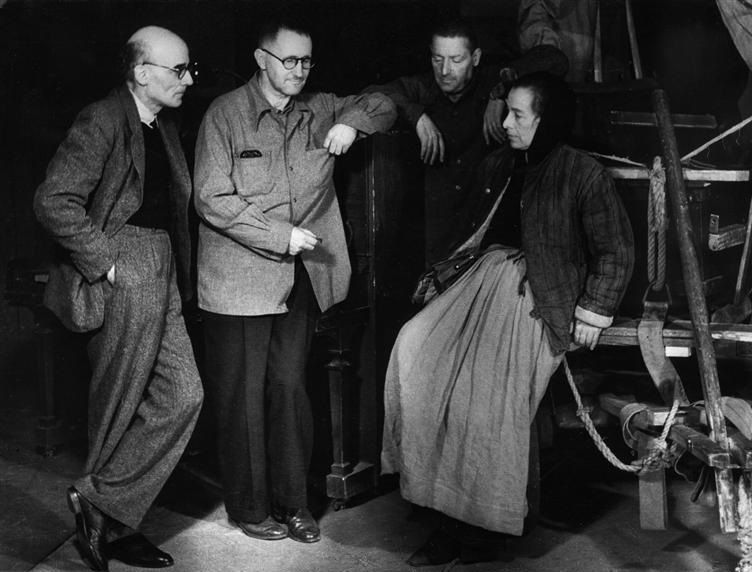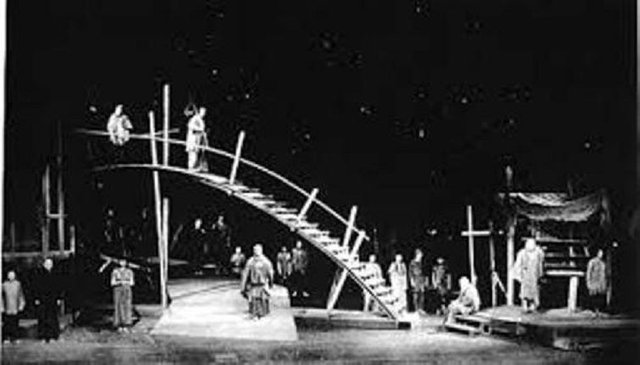Bertolt Brecht and the theater
Bertolt Brecht's glory as a poet and playwright often overshadows his performances as a theorist of the theater. As a young man, along with his first dramaturgical attempts, he also published theatrical criticism, as well as the theoretical article "For the Old and New Theater". Throughout his creative journey, Brecht, who lived from 1898 to 1956, was trying to rehearse a new type of drama and tried to analytically justify it. His most significant work in this area was the Essayist Treatise, entitled "Small Organon for the Theater," created in 1948 in emigration. Brecht begins with the seemingly paradoxical thesis that the new theater with contempt rejects the cult of the wonderful, fed by the hatred of doctrine and neglect to the benefit, even more so that this cult does not give birth to anything wonderful. But Brecht and his followers do not intend in their stage practice to leave the kingdom of delight. Because the theater - Brecht thinks - is a recreation in living images of actual or fictional events and human relationships for the purpose of entertainment. This is the most noble function of the theater and it gives it special dignity. If we turn the theater into a moral outlet, for example, it would not make it a higher rank. On the contrary, it would be diminished if we did not enjoy the morality, and it was a pleasure for the senses.

Of course, different historical epochs have had different kinds of pleasures depending on the way people cohabit. The tyrant-driven demos in the Hellenic Circus had to be amused differently from the Ludwick XIV feudal court. The theater was supposed to create other images of human cohabitation, not just an image of another life but also an image of another kind. Science in a whole new way defines our common life, and that is, life in general. According to Brecht, science and art resemble the fact that both are called to relieve people's lives: science deals with their livelihood, and art - with their entertainment. What is that fruitful attitude towards nature and the society that we, a child of a scientific age, would be willing to master in our theater? Brecht asks again. And responds: This attitude can only be critical. The critical attitude towards a river is reflected in the correction of its flow, to an orchard - to its cultivation, and to society - to its reorganization, Brecht concludes. However, the theater can only assimilate this free attitude if it is filled with the most fiery streams of public life and cooperates with those who are most eagerly seeking to achieve significant transformations. In this way, the theater will allow viewers to enjoy the special morality of their age, which stems from productive labor. Turning criticism into pleasure, the theater will have no binding moral tasks, but it will have many opportunities. But in order to realize these ideas, we can not leave the theater as we have found it, "says Brecht. Wherever we look at the theater, we will find viewers hanging almost immobile in a rather strange state: as if their muscles are tense in an unusual effort or they are relaxed in full exhaustion. They barely communicate with each other, sitting together, but as if sleeping and dreaming a nightmare. They stare in the scene as enchanted. The state of excellence, in which viewers seem to be devoted to vague but strong feelings, is deeper as the actors work better and, as we do not like this situation, we want our actors to play as badly as possible. The theater that we have found succeeds in turning hope-filled descendants of the scientific age into a scared, trusting and enchanted crowd. And we need a theater - Brecht continues - that not only gives us the opportunity to learn feelings, views and suggestions that are acceptable to the stage of the historical struggle of interpersonal relations, but a theater that creates the thoughts and feelings necessary for the change of this battlefield. But such a theater requires a special method of acting that does not interfere with the free and living thinking of the viewer.

And here, Bertolt Brecht exposes his later, renowned "epic" method:
"The method of voice acting between World War I and World War II was tested in Berlin's Am Schiffweeramm Theater based on the" alienation effect. "An alien image is such an image that, while allowing the viewer to get to know the subject, at the same time it presents him as something else. Ancient and medieval theater have alienated their characters through masks of animals and animals, and the Asian theater still serves musical and pantomimetic effects of alienation. Immersion and yet their technique, rather more than less than methods that achieve immersion is based on hypnotic suggestion. Public aims of these ancient effects of alienation were completely different from ours.
The ancient effects of alienation deprive the viewer of any possibility of attacking the image, making it invincible. The new effects are not inherent in any deliberate curiosity; only the unscientific sight condemns the stranger as strange. The new effects of expropriation need only remove from the impending social processes the stamp of the familiar, which today prevents them from being attacked. What has not changed for a long time seems unchangeable. At every step we come across things we think are so self-evident that we do not have a hard time understanding them. Everything that people acquire as a life experience in communicating with each other, they perceive it as a living experience of mankind. The child who lives in a world of old people knows their ways. It comprehends the phenomena as they represent it. If someone dares to want something more, he seeks it only as an exception. Even if he perceives that his destiny predetermined by the "providence" is predetermined by society-that mighty assemblage of beings like him-he would perceive it as an indivisible whole, larger than the sum of its constituent parts, which does not lend itself to no impact. Still, this inaccessible power she considers to be familiar, but who does not trust what she knows? In order for this life experience of mankind to be seen as equally dubious, one should develop within himself that alienated gaze that the great Galilean has observed the chandelier pendulum. This movement has surprised him as something quite unexpected and inexplicable, and as a result he has finally come to terms with his laws. It is this - as difficult and as fruitful - the view of the theater must create in the viewer its images of human cohabitation. It is necessary to make his audience wonder, and this is achieved through the technique of alienating the acquaintance.

One of the pleasures of our age in which so many and varied changes in nature are made is to understand everything in such a way that we can interfere. In man, we say, a lot is invested, hence much can be done. Man does not have to stay as he is; and we have to look at it not only as it is, but as it may be. We should not go out of it but go to it. However, this means that I should not just put myself in my place, but I have to stand before him, representing all of you. That is why the theater should alienate what it shows. In order to achieve the effect of alienation, the actor must give up everything he has learned in his attempt to bring the audience into life in the images he creates. And if he does not intend to bring his audience to a state of trance, he himself should not fall into trance. His muscles should not be tense. For example, if he turns his head with stretched muscles on his neck, this movement "magically" takes his gaze with him, and sometimes even the heads of the viewer, and any thought or emotional excitement caused by this gesture is already diminishing. The actor's speech must be released from all sorts of pop music and from those cadences that silences viewers, so the meaning of words is lost. Even when he depicts madmen, the actor must not become a madman himself; how else could the viewers understand what exactly the madmen were possessed?

Not for a moment, he must not allow himself to fully embody the depicted character. The review: "He was not playing Lyr, he was Lir himself" - it should be devastating to the actor. He has only the task of showing his hero or, more precisely, his job is not only to experience it; this does not mean that when he depicts a passionate man, he himself should remain cool. But his own feelings should not, in principle, be covered with the feelings of his hero, so that the feelings of the audience do not generally coincide with those of the hero. The public must have complete freedom. And because the actor appears on stage in a double image - like Lawton and Galileo - where the displaying Logon does not melt in the displayed Galileo, this method of acting has the name "epic". Ultimately, this only means that the actual, unscrupulous process of performance is no longer overwhelmed - the scene is precisely Lawton and shows what Galilee imagines. Admiring his play, the audience naturally would not have forgotten Lawton, even if he was trying to get his character to the end, but then the viewers would not have come to his own thoughts and feelings as they would completely melt into the character. The image would have conquered his thoughts and feelings so that in fact only one single model would emerge: the actor would impose this model on us as well. To prevent this damage, he has to make art and the very act of showing. " Bertolt Brecht creates a theater that allows the viewer to show creativity by going beyond the bounds of the events. In this theater, one has to delight in enjoying the devastating work that provides him with food and the fears of his constant transformation. Here it will be done in the lightest way; because according to Brecht the lightest way of existence is in art.
Man, @godflesh, these are the kind of gems that show up on Steemit and remind me of how special this site is. I’m a huge history enthusiast. This was all new material for me. Thanks for sharing.
Thank you @kommienezuspadt, for your kind words :)
Theater is one of my passions, especially the approach to it and the different worldviews of how theater must be made.
@godflesh, I have a degree in German literature, so it was a treat to read your piece on Brecht after many years of archiving him in the dusty recesses of my brain. Your posts are kicking my intellectual butt and are a challenge to restore literature and philosophy to a more prominent place in my life. Thank you!
I am glad to hear that :) Thank you too :)
Birtolt Brasht's glory as a poet and playwright. That's the post you're doing. It's very good boss..thank you@godflesh.
You are welcome :)
Well... to be honest I don't like him really much as a poet. :)
The best and most beautiful things in the world cannot be seen or even touched - they must be felt with the heart
True :)
IT IS A VERY INFORMATIVE POST BRO
THANKS FOR SHARING THIS KIND OF INFO
You are welcome :)
one of my theater favorites!
I prefer the theater of Beckett and Eugène Ionesco. :)
I saw "Mutter Courage und ihre Kinder" once - although the actors were really good, the play is pretty boring and it goes on and on... Brecht is standard German school curriculum, which doesn't make it better.
oh and: he borrowed a lot from Shakespeare ;-)